This brief report presents self-reports of recovery among adults aged 18 and older in the United States who thought they ever had a problem with their use of drugs or alcohol and/or mental health. These findings provide a clearer characterization of the factors associated with recovery among adults and how future efforts can foster a whole-health approach to sustain recovery from mental health and substance use conditions.
Dashboard: Filter Bricks
Main page content
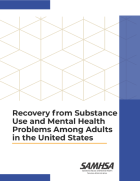
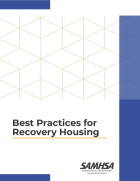
This document updates SAMHSA’s 2018 document and outlines best practices for the implementation and operation of recovery housing. These best practices are intended to serve as a tool for states, governing bodies, providers, recovery house operators, and other interested stakeholders to improve the health of their citizens, reduce incidence of overdose, and promote recovery housing as a key support strategy in achieving and sustaining recovery.
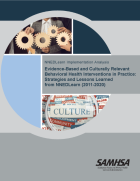
This report provides findings from a qualitative analysis of evidence-based and culturally relevant behavioral health practices offered at NNEDLearn, a SAMHSA training, offered from 2011 to 2020. It includes an overview of NNEDLearn, case studies, strategies and lessons learned, and conclusion.

This guide reviews ways that telehealth modalities can be used to provide treatment for serious mental illness and substance use disorders among adults, distills the research into recommendations for practice, and provides examples of how these recommendations can be implemented.
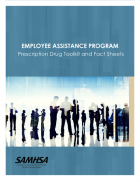
The EAP Prescription Drug Toolkit and Fact Sheets provide guidance related to counseling, referrals, and follow-up services (e.g., alternatives to prescription drugs, workplace drug misuse and relapse prevention, dangers of combined drug use, screenings, and evaluations before returning to work).

This updated manual contains a 12-week cognitive–behavioral anger management group treatment model. The content includes specific instructions and suggested remarks for group leaders, and exercises for group members. This model will work in a variety of clinical settings, and with diverse audiences.

This fact sheet (3 of 4) talks about what pregnant women with opioid use disorder should know about and expect after the birth of their baby. This resource includes information about neonatal abstinence syndrome, baby’s needs after birth, and do’s and don’ts for understanding and responding to baby’s needs.
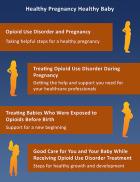
This series of four fact sheets emphasizes the importance of continuing a mother's treatment for opioid use disorder (OUD) throughout pregnancy. The series includes information on OUD and pregnancy, OUD treatment, neonatal abstinence syndrome, and considerations to address before hospital discharge.
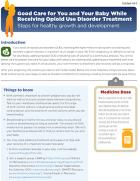
This fact sheet (4 of 4) addresses the care of women with opioid use disorder (OUD) and care of their babies after pregnancy. This resource includes information on managing OUD, caring for baby, and do’s and don’ts for creating a healthy environment at home.

This fact sheet (1 of 4) gives pregnant women with opioid use disorder (OUD) helpful steps to ensure they have a healthy pregnancy and a healthy baby. This resource includes things to know about OUD and pregnancy, and do's and don'ts to keep mother and baby healthy during pregnancy.
Displaying 1 - 10 out of 20

